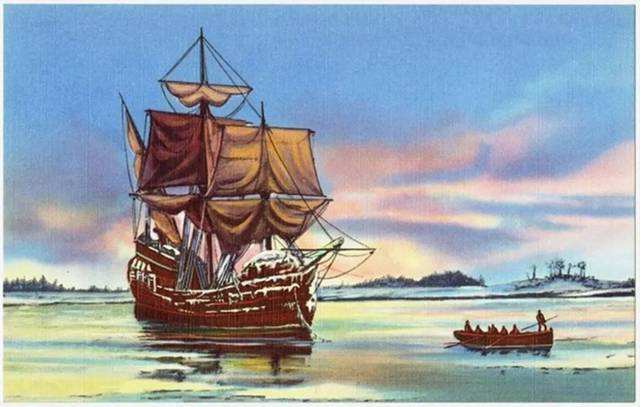On a sunny morning in July 1620, the Pilgrims kneel upon the sea-shore at Delfthaven, while the pastor prays for the success of their journey. Out upon the gleaming sea a little ship lies waiting. Money has not been found to transplant the whole colony, and scarcely one hundred have been sent. The remainder will follow when they can. These hundred depart amid tears and prayers and fond farewells. Mr. Robinson dismissed them with counsels which breathed a pure and high- toned wisdom, urging them to keep their minds ever open for the reception of new truths.
1620年七月,在一个阳光明媚的早上,清教徒们在代尔夫特海边下跪,由牧师做祷告,以祈求此次航行的顺利。茫茫海面上有一艘小船在等待。他们没有足够的钱将所有人都带走,走的人连一百都不到。如果可能,那些留下来的人会再找机会跟上去。人们眼含泪水,在祷告声中依依惜别。罗宾逊先生将大家遣散,并以忠言相告——告诫他们要保持纯净的智慧,敦促他们要永远敞开心胸准备接受新的真理。

Their little ship, the Speedwell, brought them to South-ampton, where they found the Mayflower, a ship hired for the voyage, and a small band of Pilgrims from London. At Plymouth the Speedwell was pronounced unseaworthy, and was abandoned; and the Mayflower, crowded with the whole party (one hundred and two souls), set sail alone.
他们乘着“舒碧渡”号小船前往南格兰特,他们在那里租了一艘名为“五月花”号的船,还有从伦敦来的一小拨清教徒在那里等着他们。到普利茅斯时,大家发现“舒碧渡”号小船经不住风浪,因此将其遗弃;所有人(102人)都挤在“五月花”号上,在海上孤独漂泊。
The Mayflower was a ship of one hundred and sixty tons. The weather proved stormy and cold; the voyage unexpectedly long. It was the middle of September when they sailed. It was not till the 11th November that the Mayflower dropped her anchor in the waters of Cape Cod Bay.
“五月花”号重160吨。天气寒冷,还有暴风雨;使得此次航行变得意想不到的漫长。他们起航时是九月中旬,但是直到十一月十一号才终于到达鳕鱼弯角水域。
A bleak-looking and discouraging coast lay before them. Nothing met the eye but low sand-hills, covered with ill-grown grown wood down to the margin of the sea. The Pilgrims had now to choose a place for their settlement. About this they hesitated so long that the captain threatened to put them all on shore and leave them.
他们面前是一片荒凉的海滩,让人看了不禁气馁。除了低矮的沙丘和生在于其上长得不好的树木以外,他们什么都没看到。现在这些清教徒们必须要选一个地方作为营地,他们犹豫了许久,以致于船长威胁说要将它们所有人都赶上岸,自己开船离开。
Little expeditions were sent to explore. At first no suitable locality could be found. The men had great hardships to endure. The cold was so excessive that the spray froze upon their clothes, and they resembled men cased in armour. At length a spot was fixed upon. The soil appeared to be good, and abounded in "delicate springs" or water. On the 23rd December the Pilgrims landed—stepping ashore upon a huge boulder of granite, which is still reverently preserved by their descendants. Here they resolved to found their settlement, which they agreed to call New Plymouth.
他们派出了探险队前去勘察。一开始他们没有发现可选的地方。大家都经受着痛苦。天气寒冷刺骨,水汽在他们的衣服上结冰,就像给他们穿上了盔甲。最后,他们确定了一个地方。那里的土壤看起来很不错,而且到处都是清甜可口的山泉。十月二十三日,他们登上了这片土地——踏上一个巨大的花岗石,这块石头至今还被其后代虔诚供奉保留。他们决定在这里定居,一致同意将其命名为新普利茅斯。
The winter was severe, and the infant colony was brought very near to extinction. They had been badly fed on board the Mayflower, and for some time after going on shore there was very imperfect shelter from the weather. Sickness fell heavily on the worn-out Pilgrims. Every second day a grave had to be dug in the frozen ground. By the time spring came in there were only fifty survivors, and these sadly enfeebled and dispirited.
极其寒冷的冬天让这个新建的群体近乎灭绝。他们在船上吃得很差,而且有时上岸之后很难找到理想的避寒之地。疾病在这群穷困潦倒的清教徒中肆虐。每隔两天就会死一个人,只有五十个人挨到了第二年的春天,而且它们也是虚弱无力,萎靡不振。













